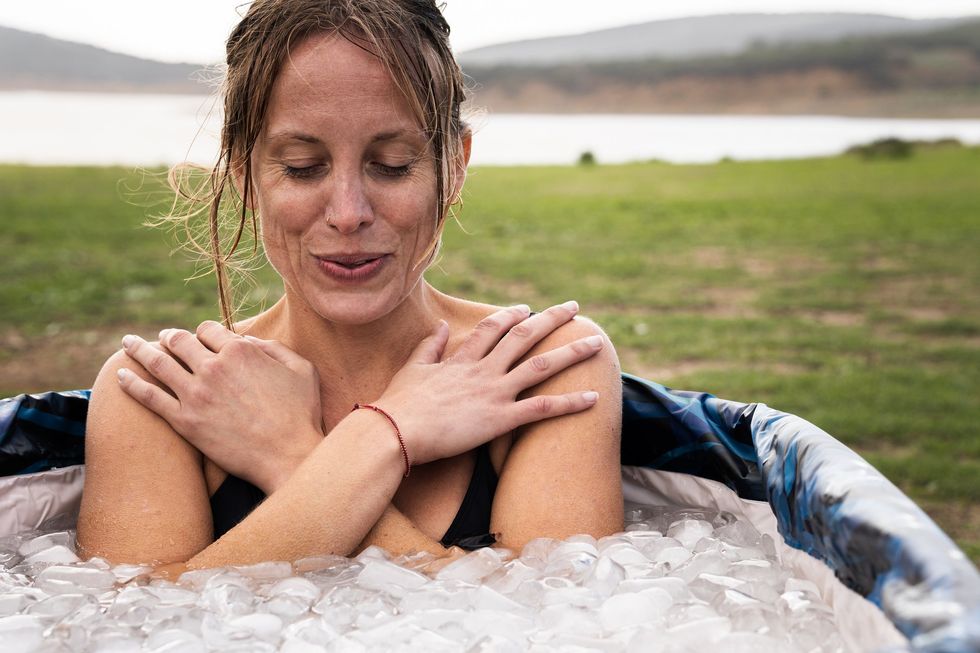

I’m from Michigan, so I know what the cold is. Now I live in Las Vegas, because I know what the cold is.
All those years digging my snow car have given me a freezing phobia: I try to avoid anything that is associated with the cold. I drink hot tea. I prefer my true cases of crimes resolved. I don’t know where Islandia is on a map. And I am a fan of Netflix, you can keep the cold.
It is difficult for me to wrap my brain doing something Arctic on purpose. But cold tires have become increasingly popular in recent years, especially on social networks. The hashtag #Coldplunge has more than one billion opinions about Tiktok, and «Cold -dung Women» has more than 144 million publications.
Read: The latest Tiktok Tiktok’s tendas: heart or hype? >>
What is a cold fall?
A cold immersion, also called immersion in cold water, is when it is immersed in cold water (about 50 degrees) in an effort to achieve physical and/or mental health benefits. Think of a bathtub full of cold water and ice cubes or a body of cold water like a lake.
The fall of the cold is not new: the icy hobby dates back to ancient Greece. And you have probably seen athletes and artists like Lady Gaga publishing photos of ice baths after demanding training.
The benefits of a cold fall
The supporters of the fall say that it can help improve health conditions, such as inflammation and chronic pain, as well as promoting general well -being.
Research on the benefits of cold drop is in progress, and most of the studies that exist at this time involve small groups of people. But there is some science to take into account behind the possible health advantages of the cold fall.
Possible benefits may include:
- Decrease in pain and inflammation: During a cold immersion, their blood vessels narrow themselves to save the heat of the body, which reduces blood flow and decreases inflammation, swelling and nerve activity. The cold also numbs the body, which can reduce pain.
- Improved mood: Getting cold with you releases chemicals to feel good in your brain, such as dopamine and serotonin, and studies have linked immersion in cold waters with a positive change in mood and increased self -esteem. A 2023 study He found five minutes in a cold water bath, the participants felt more alert, proud and inspired.
- Lower cortisol levels: A cold immersion can naturally help reduce hormonal cortisol levels. His body releases cortisol during stressful situations, and high cortisol levels can lead to serious health problems, such as high blood pressure. One study They discovered that the people who spent 15 minutes in cold water had lower levels of cortisol for up to three hours after being in the water.
- An impulse of metabolism: When it trembles, as water should freeze, their muscles contract. This increases the metabolic rate and helps him burn more calories than he would do if he were not in cold water. Studies also show that cold sinking has a positive effect on brown adipose tissue, a type of body fat that is activated by cold and helps burn calories. However, impulse is not enough to help weight loss without the addition of lifestyle and diet changes.
- Better blood sugars: Repeated immersions of cold water can increase the level of a key protein in the body that protects against insulin resistance.
- Increased immunity: Some investigation He has linked cold stripes with an increase in white blood cells, which means that his immune system may be stronger against infection.
How long should you immerse cold?
The cold takes between three and five minutes to penetrate beyond the skin, so most people remain in the water between five and 10 minutes.
Beginners usually start at 30 seconds or a minute and go up.
The time dedicated to water also varies according to the temperature and its level of comfort, but remain in more than 10 minutes increases the risk of hypothermia.
Who should not try cold falling therapy?
Any person with a chronic health condition should speak with a medical care provider before trying the immersion in cold waters.
A cold drop can cause greater breathing, heart rate and blood pressure. This can put stress in the heart and can cause abnormal beats, so people with heart disease or heart condition should avoid cold drop.
You may also want to omit it if you live with:
Other cold sinking risks include drowning and hypothermia.
Should you take the step?
Immersion in cold water is not for everyone. And without significant research, it is difficult to know if possible health benefits are worth it. Talk to your medical care provider before jumping.
Related articles on the web






